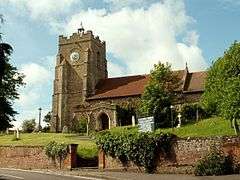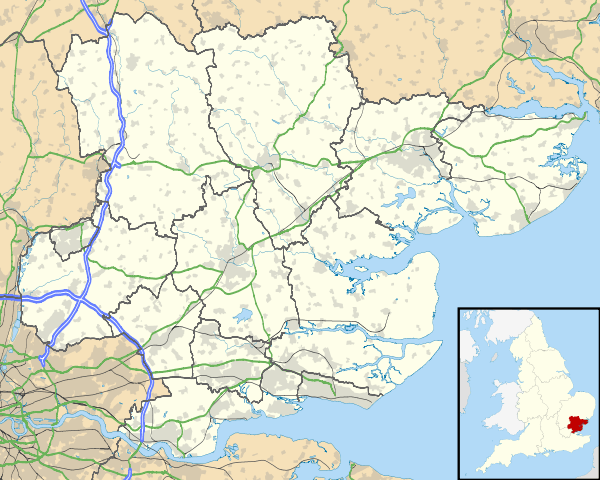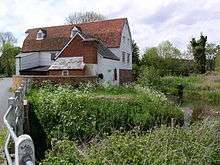Sible Hedingham
Sible Hedingham is a large village and civil parish in the Colne Valley in the Braintree District of Essex, in England. It has a population of 3,994 according to the 2011 census.[1] Sible Hedingham lies in the northern corner of Essex, close to both the Suffolk and Cambridgeshire borders. The village covers some 2,123 hectares (5,246 acres).
| Sible Hedingham | |
|---|---|
 St Peter's Church | |
 Sible Hedingham Location within Essex | |
| Population | 3,994 (2011)[1] |
| OS grid reference | TL7734 |
| Civil parish |
|
| District |
|
| Shire county | |
| Region | |
| Country | England |
| Sovereign state | United Kingdom |
| Post town | HALSTEAD |
| Postcode district | CO9 |
| Dialling code | 01787 |
| Police | Essex |
| Fire | Essex |
| Ambulance | East of England |
| UK Parliament | |
The Domesday Book lists the village together with Hedingham Castle amongst the lands given to Roger Bigod by the king.[2][3] The land included woodland for 70 pigs that was in total valued at £4.
A variation on the village name is "Hengham Sybyle".[4]
The village is twinned with the French commune of Choisy-au-Bac,[5] located in Picardy region, Oise department (c. 80 km north of Paris, near Compiègne).
Notable people associated with Sible Hedingham
- J. Redwood Anderson (1883–1964), poet died here[6]
- Rachel Barrett (1874–1953), suffragette and newspaper editor
- Savitri Devi (1905–1982), prominent proponent of animal rights, deep ecology and Nazism, who died here
- 'Dummy', an unnamed elderly man killed in 1824 after he was accused of witchcraft
- Sir John Hawkwood (1320–1394), English mercenary (or condottiere) who was active in 14th-century Italy[7]
- John Hilton (surgeon) FRCS, FRS, FZS (1805–1878), Surgeon Extraordinary to Queen Victoria and greatest anatomist of his time[8]
- Samuel Wilbore (1595-1656) – a founder of Portsmouth Colony (Rhode Island, US; 7 March 1638) as a religious dissenter from the Plymouth Colony of Boston, Massachusetts

Alderford Mill
gollark: I mean, in lots of cases big companies actually *don't* have enough money to, say, cover several months of zero revenue.
gollark: Expensive yes, but "damaging for space"? Who cares? Besides, there are ridiculous amounts of asteroids.
gollark: That's *something*, I guess.
gollark: And you have to provide those to make *any* payments?
gollark: It's just... if you have 19 digits, you can make arbitrary payments using someone's account?
References
- "Sible Hedingham Parish Local Area Report". nomisweb.co.uk. Office for National Statistics. 2011. Retrieved 30 January 2019 – via Durham University.
- Domesday Book: A Complete Translation. London: Penguin, 2003. p. 1036 ISBN 0-14-143994-7
- Roger Bigod held a number of manors including a massive number in Suffolk and Norfolk given to him by the King. These obviously included Sible Hedingham, but also included Pebmarsh, Ovington and the area of Belchamp.
- Plea Roll of the Court of Common Pleas; National Archives; CP 40/647; http://aalt.law.uh.edu/AALT1/H6/CP40no647/bCP40no647dorses/IMG_0761.htm; third entry, second line residence of John Ekefeld, yeoman
- "A French connection: Twinning teams mark 25 years together". Halstead Gazette. Retrieved 30 January 2019.
- "Death of Poet". Birmingham Post (32893). 30 March 1964. p. 22. Retrieved 17 February 2019 – via British Newspaper Archive.
- Fowler, Kenneth (8 October 2009). "Hawkwood, Sir John (d. 1394), military commander". Oxford Dictionary of National Biography (online ed.). Oxford University Press. doi:10.1093/ref:odnb/12693. (Subscription or UK public library membership required.)
- Kirkup, John (23 September 2004). "Hilton, John (1805–1878), anatomist and surgeon". Oxford Dictionary of National Biography (online ed.). Oxford University Press. doi:10.1093/ref:odnb/13327. (Subscription or UK public library membership required.)
This article is issued from Wikipedia. The text is licensed under Creative Commons - Attribution - Sharealike. Additional terms may apply for the media files.